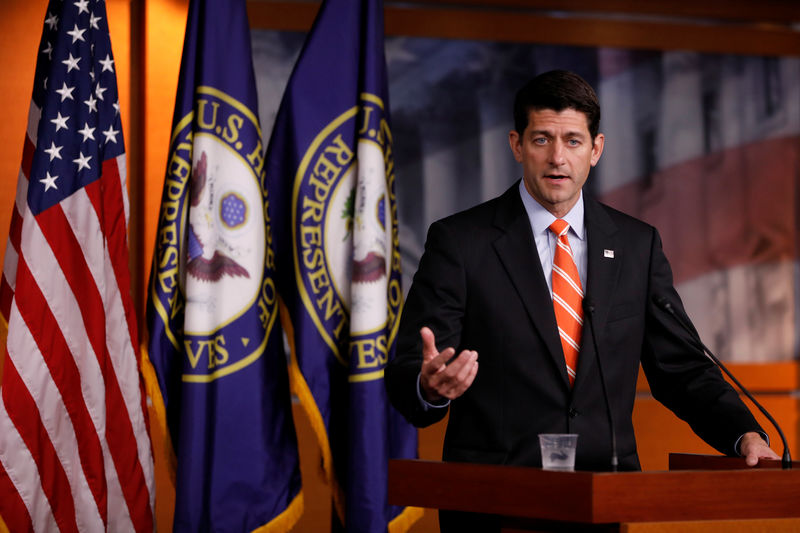Investing.com’s stocks of the week
By Susan Cornwell and Yasmeen Abutaleb
WASHINGTON (Reuters) - Senate Republican leaders were set on Thursday to unveil revised major healthcare legislation sought by President Donald Trump, with the proposal retaining key Obamacare taxes on the wealthy, as they try to resolve deep differences within the party.
U.S. Senate Majority Leader Mitch McConnell, known as a skillful tactician, was due to present the updated legislation in a bid to unite disparate Republican factions and make good on his party's seven-year mission to dismantle Democratic former President Barack Obama's signature legislative achievement.
The legislation will retain two taxes on the wealthy that helped pay for the Obamacare law, according to a Senate source familiar with the plan. They are: a 3.8 percent tax on net investment income for individuals earning more than $200,000 and couples earning more than $250,000; and an 0.9 percent surtax for the Medicare insurance program for the elderly on people with those incomes.
These provisions could appeal to Republican moderates who have balked at the prospect of cutting taxes for the wealthy while reducing benefits for the poor.
While companies can generally deduct employee salaries as a business expense, Obamacare capped the tax deductions on health insurance executive salaries at $500,000, and the new Senate bill will keep that cap, the source said.
Conservative Senator Ted Cruz said the legislation will include his proposal to let insurers offer stripped-down, low-cost healthcare plans that do not comply with Obamacare regulations to cover certain "essential" health benefits. Those benefits include maternity and newborn care, mental health services and addiction treatment, outpatient care, hospitalization, emergency room visits and prescription drugs.
Insurers oppose Cruz's proposal and said it would harm people with pre-existing medical conditions by making their insurance unaffordable.
The revised bill also will include $45 billion for fighting the opioid addiction epidemic hitting large parts of the nation, the Senate source said.
Repealing and replacing Obamacare, which Republicans fault as a costly government intrusion into the healthcare system, was a top campaign promise for Trump, who was monitoring the Senate developments during his visit to France.
McConnell has little room for error, as even three "no" votes among Republican senators would sink the legislation in the 100-seat Senate because Democrats are united against it. Republicans have a 52-48 majority, with Vice President Mike Pence able to cast a potential tie-breaking vote.
But 10 Republican senators had voiced opposition to the previous version of the bill, and McConnell faced a difficult task in coming up with a plan that could unite party moderates and hard-line conservatives. McConnell has planned for a vote on the bill next week.
Complicating matters further, two Republican senators, Lindsey Graham and Bill Cassidy, offered an alternative healthcare proposal even before McConnell unveiled his new plan. It would redirect much of federal funding for health insurance to states.
The fact that Republicans still lack consensus on what to do with Obamacare after calling for its demise since Congress passed it in 2010 with only Democratic votes shows that it is no sure thing that Trump's party will be able to get the job done.
Healthcare is Trump's first major legislative initiative, and failure would call into question his party's ability to govern despite controlling both chambers of Congress and the White House.
'VERY ANGRY'
Trump said in an interview with the Christian Broadcasting Network on Wednesday he would be "very angry" if he does not get a bill on his desk to repeal and replace the 2010 Affordable Care Act, dubbed Obamacare. Trump put pressure on McConnell, saying he "has to pull it off" in the Senate.
The House of Representatives on May 4 passed its own version of healthcare legislation.
Moderate Republican senators have been uneasy about a forecast that millions of people would lose medical insurance under the legislation, while hard-line conservatives say it leaves too much of Obamacare intact.
The previous draft of the bill unveiled last month would phase out the Obamacare expansion of Medicaid health insurance for the poor and disabled, sharply cut federal Medicaid spending beginning in 2025, repeal many Obamacare taxes, end a penalty on individuals who do not obtain insurance and overhaul Obamacare subsidies to help people buy insurance with tax credits.
While ending a fine on people who decline to obtain insurance, the Senate bill would force people who let their coverage lapse to wait six months before coverage could resume. The provision is intended to stop people from waiting until getting ill to buy health insurance because insurers need to have lots of healthy people obtaining policies to offset the expense of care for sick people.
The nonpartisan Congressional Budget Office (CBO) forecast that the previous Senate healthcare bill would increase the number of people without health insurance by 22 million by 2026.
The Senate healthcare approach has drawn opposition from large parts of the U.S. healthcare industry, including doctors and hospitals as well as leading medical advocacy groups and groups representing the elderly. Business groups, including the U.S. Chamber of Commerce, supported it.
